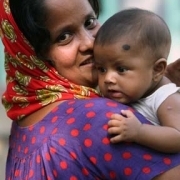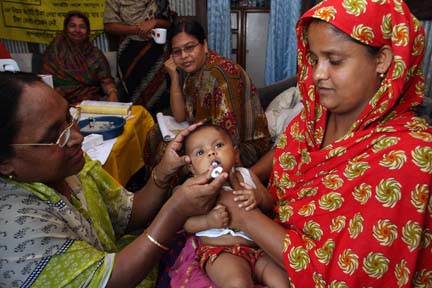Blazing trails in Bangladesh
|
It was just about a year ago that I traveled to Bangladesh for my first trip to “the field,” journeying outside of a capital city and into the villages and neighborhoods to meet the families that our work can most directly impact.
Overwhelming sunlight shone brightly in a clear sky, as I followed local researchers along a thin trail between rice paddies and corn fields toward Nagda village.
In Nagda, children gathered around to stare shyly, and young mothers invited me into their small but efficient homes. We talked about their newborns, the frightening but exhilarating particulars of becoming a new mother, and their chance to take part in a study that could be the first step in keeping all children safe from the ever-present danger of a debilitating bout of diarrhea.
New and experienced mothers alike knew this threat all too well. Though most couldn't name the specific cause, the stories they told me of now-grown children who had survived severe and scary illness suggested rotavirus - vomiting accompanied by almost-constant diarrhea only remedied by an urgent hospital visit and lifesaving rehydration. The mothers I met were afraid of diarrhea, but their new babies had the sheer luck of being born within a very special window. They happened to be in the right place at the right time—and eligible according to clinical criteria—to enroll in a study that would measure the effectiveness of a new vaccine against rotavirus.
A major partner in the study is the International Center for Diarrhoeal Disease Research, Bangladesh (ICDDR,B)— renowned for its work throughout the country and, indeed, worldwide. A pioneer in the use of oral rehydration solution, ICDDR,B is now a leader in bringing all resources to bear when it comes to treating children and educating their caregivers. In addition to its primary role in the rotavirus vaccine study, ICDDR,B set a standard that every child admitted for severe diarrhea be given a course of zinc for treatment, as well as prevention against future infections. Before children are released from the hospital, their mothers receive information on breastfeeding and proper nutrition for young children that will give them the strength to survive a host of environmental threats.
Like the example set by ICDDR,B in forging a path for diarrheal disease control around the country by  applying simple and successful tools, the mothers I met are pioneering in their own right. Time and again, when I asked them why they wanted to take part in the trial, they looked beyond themselves to the neighbors and families that one day could also benefit from rotavirus vaccines. The information gleaned from studying a vaccine that was protecting their children today will be important as Bangladesh and other countries consider broadly introducing rotavirus vaccines. One day, the protection that their babies received would extend to all children in their village, and perhaps to all children everywhere.
applying simple and successful tools, the mothers I met are pioneering in their own right. Time and again, when I asked them why they wanted to take part in the trial, they looked beyond themselves to the neighbors and families that one day could also benefit from rotavirus vaccines. The information gleaned from studying a vaccine that was protecting their children today will be important as Bangladesh and other countries consider broadly introducing rotavirus vaccines. One day, the protection that their babies received would extend to all children in their village, and perhaps to all children everywhere.
--Deborah Phillips is a communications officer for diarrheal disease and rotavirus vaccine programs at PATH and is looking forward to her next field adventure.














